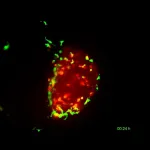(Press-News.org) Pathological abnormalities associated with motor neurone disease have been identified using a new technique developed at the University of Birmingham.
The method will help scientists better understand the changes in the brain that lead to motor neurone disease (MND) and could eventually yield insights that will help with the development of new treatments. The abnormalities were identified in a collaboration between the University of Birmingham and the University of Sheffield and published today [8 Aug] in Nature Communications.
Motor neurone disease, also known as amyotrophic lateral sclerosis or ALS, is a muscle wasting condition caused by messages from the brain’s motor neurones not reaching the muscles, causing them to weaken. Around 5,000 people in the UK have the disease at any one time and currently there is no cure.
At the University of Birmingham researchers have developed a technique that enables them to examine specific proteins in their native state, directly from brain and spinal cord tissue samples. Called native ambient mass spectrometry (NAMS), the tool enables the structure of proteins to be studied in relation to their location within the tissue in greater detail than ever before.
Working with colleagues at the University of Sheffield, they were able to identify a metal deficiency in a specific protein, known as SOD1, and show that it accumulates in specific regions of the brain and spinal cord in mice with MND.
SOD1 has been implicated in motor neurone disease previously but this is the first time that detailed molecular imaging has been able to show how versions of the protein with missing metal ions accumulate in the affected mice.
Lead researcher Helen Cooper, in Birmingham’s School of Biosciences, said: “This approach is the first to show that this form of SOD1 correlates with the pathology of motor neurone disease. It’s a very early step towards finding treatments for MND and is also an exciting new route for understanding the molecular basis of other diseases in unprecedented detail.”
Richard Mead from the Sheffield Institute for Translational Neuroscience said: “We were very excited to apply this fantastic methodology which Helen’s team have developed to gain new insights into the biology of MND and we look forward to using the technology further to explore why motor neurons die and find new interventions for those affected by MND.”
The next steps for the researchers will be to test to see if the same imbalances are present in human tissue samples, and to try to treat the imbalance in the mice using available drug compounds.
ENDS
For media enquiries, interviews, or an embargoed copy of the research paper please contact Press Office, University of Birmingham, tel: +44 (0)121 414 2772 or email pressoffice@contacts.bham.ac.uk
Notes to editor:
The University of Birmingham is ranked amongst the world’s top 100 institutions. Its work brings people from across the world to Birmingham, including researchers, teachers and more than 8,000 international students from over 150 countries.
The University of Sheffield is a leading Russell Group university, with a world-class reputation. Over 30,000 students from 150 countries study at Sheffield. In a truly global community, they learn alongside over 1,500 of the world’s leading academics.
‘Native ambient mass spectrometry imaging of SOD1 protein-metal complexes in SOD1G93A transgenic mice implicates demetalation, not monomerization, in the development of pathology’ - Oliver J. Hale, Tyler R. Wells, Richard J. Mead, and Helen J. Cooper is published in Nature Communications.
The Sheffield Institute for Translational Neuroscience (SITraN) has increased the visibility of neurological diseases research in the UK. The Queen’s Anniversary Award 2019 and The Future NHS Parliamentary award 2019 recognised the impact it has had in developing new treatments that give hope to patients and carers in the UK and worldwide. SITraN is an essential development in the fight against motor neurone disease and other common neurodegenerative disorders including Parkinson's and dementia, as well as stroke and multiple sclerosis.
END
Imaging technique uncovers protein abnormality in motor neurone disease
2024-08-08
ELSE PRESS RELEASES FROM THIS DATE:
Scientists unravel how the BCG vaccine leads to the destruction of bladder cancer cells
2024-08-08
Using zebrafish “Avatars”, an animal model developed by the Cancer Development and Innate Immune Evasion lab at the Champalimaud Foundation (CF), led by Rita Fior, Mayra Martínez-López – a former PhD student at the lab now working at the Universidad de las Américas in Quito, Ecuador – and colleagues studied the initial steps of the Bacillus Calmette-Guérin (BCG) vaccine’s action on bladder cancer cells. Their results, which are published today (August 1, 2024) in the journal Disease Models and Mechanisms, show that macrophages – the first line of ...
Cleveland Clinic study adds to increasing evidence that sugar substitute erythritol raises cardiovascular risk
2024-08-08
August 8, 2024, Cleveland: New Cleveland Clinic research shows that consuming foods with erythritol, a popular artificial sweetener, increases risk of cardiovascular events such as heart attack and stroke. The findings, from a new intervention study in healthy volunteers, show erythritol made platelets (a type of blood cell) more active, which can raise the risk of blood clots. Sugar (glucose) did not have this effect.
Published in Arteriosclerosis, Thrombosis and Vascular Biology, the research adds to increasing evidence that erythritol may not be as safe as currently ...
Microscopy technique “paves way” for improving understanding of cellular functions
2024-08-08
Scientists have developed a new way of counting labelled proteins in living cells that could become a standard and valuable tool in the field of biomedical research.
This powerful new technique, known as Protein-tag Degree of Labelling (ProDOL), provides a robust and versatile approach for precisely determining labelling efficiencies, the number of proteins that are labelled with fluorescent markers in living cells, in microscopy, a crucial aspect of protein quantification in biological research.
The method ...
Microbes conquer the next extreme environment: Your microwave
2024-08-08
Since the industrial revolution, microbes have successfully colonized one novel type of habitat after another: for example marine oil spills, plastic floating in the oceans, industrial brownfields, and even the interior of the International Space Station.
However, it turns out that one extreme environment harboring a specialized community of highly adapted microbes is much closer to home: inside microwaves. This finding has now been reported for the first time in a study in Frontiers in Microbiology by researchers from Spain. It’s not only important from the perspective of ...
ISTA speeds up academic AI research with NVIDIA accelerated computing
2024-08-08
The Institute of Science and Technology Austria (ISTA) today announced it is investing in a state-of-the-art cluster of over 100 NVIDIA H100 Tensor Core GPUs to enhance its computing infrastructure and scale up machine learning for academic research. The latest-generation GPU cluster specializes in training large language models for generative AI and machine learning. The Institute-funded, multi-million investment helps accelerate AI research in the public sphere at scale and consolidates ISTA as a European computational hotspot.
In the generative artificial intelligence (AI) era, AI research and ...
$11.3 million Program Project grant helping identify causes of vascular disease
2024-08-08
AUGUSTA, Ga. (Aug. 8, 2024) – With a new $11.3 million Program Project grant from the National Institutes of Health, experts from the Vascular Biology Center at the Medical College of Georgia at Augusta University are working to better understand the underlying mechanisms of cardiovascular disease.
“Blood vessels are critical for the transport of oxygen, nutrients, and immune cells and when they don’t function properly it not only impacts the function of the heart, but other organs such as the lung, eye, brain ...
Steady flight of kestrels could help aerial safety soar
2024-08-08
A new joint study by RMIT and the University of Bristol has revealed secrets to the remarkably steady flight of kestrels and could inform future drone designs and flight control strategies.
Watch video: YouTube
Making drones safer and more stable in turbulent conditions, or in cities where wind gusts from tall buildings make flying more difficult, makes applications like parcel delivery, food delivery and environmental monitoring more feasible, more often.
The study conducted in RMIT’s Industrial Wind Tunnel facility – one of the largest of its kind in ...
Molecule restores cognition, memory in Alzheimer’s disease model mice
2024-08-08
In a new study, a molecule identified and synthesized by UCLA Health researchers was shown to restore cognitive functions in mice with symptoms of Alzheimer’s disease by effectively jumpstarting the brain's memory circuitry.
If proven to have similar effects in humans, the candidate compound would be novel among Alzheimer’s disease treatments in its ability to revitalize memory and cognition, study authors said.
“There is really nothing like this on the market or experimentally that ...
C-Path inaugural Global Impact Conference: Pioneering drug development collaborations
2024-08-08
TUCSON, Ariz., August 7, 2024 – Critical Path Institute (C-Path), whose mission is to lead collaborations that accelerate drug development, advancing better treatments for people worldwide, is proud to announce its inaugural C-Path Global Impact Conference (CGIC), taking place from September 9-11, 2024, at the Washington Marriott at Metro Center.
The conference represents a significant expansion of C-Path’s mission, focusing on critical areas of drug development. These areas highlight ...
Skin-to-skin ‘kangaroo care’ found to boost neurodevelopment in preemies
2024-08-08
Skin-to-skin cuddling with a parent has lasting cognitive benefits for premature babies, according to a new Stanford Medicine study. Preemies who received more skin-to-skin contact, also known as kangaroo care, while hospitalized as newborns were less likely to be developmentally delayed at 1 year of age, the study found.
The research, which was published online July 11 in the Journal of Pediatrics, showed that even small increases in the amount of skin-to-skin time made a measurable difference in the babies’ neurologic development during their first year.
“It’s ...




